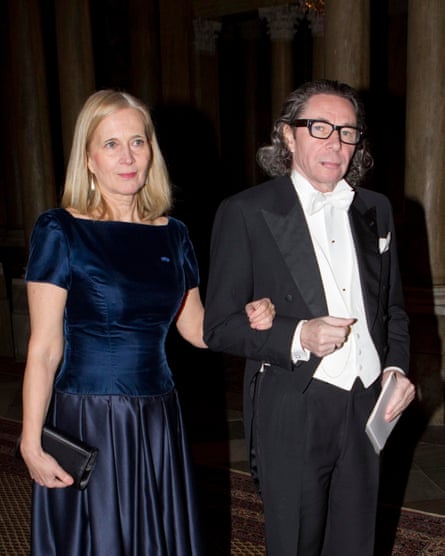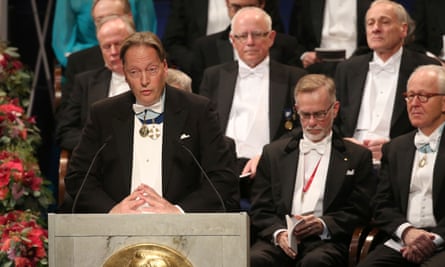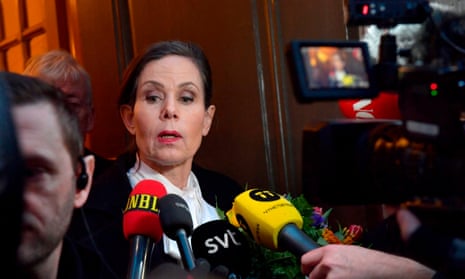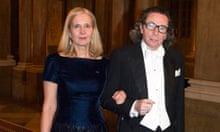The Nobel Prize for literature has been shaken by the worst scandal in its history. In a row which brings together sexism, money and privilege, along with levels of spite that would shame a kindergarten, three of the 18 members stepped down last week, in protest because they lost a vote to exclude a fourth member, Katarina Frostenson, a poet whose husband stands accused of 18 separate instances of sexual harassment, including rape.
By Thursday night, the resulting public scandal had led to departures of both Frostenson and the permanent secretary Sara Danius – who had been among her accusers – after they were forced out after a three hour meeting.
Public feuding among the normally secretive members of the Academy has reached an unprecedented pitch. One member, writer and journalist Per Wästberg, described Thursday’s deal in a newspaper piece as “compromised horse trading which sacrificed two women, one against the other. It is a stain on the Academy’s reputation which cannot be cleaned off – and all this because of a sexual predator!”
The obvious answer would be mass resignations and starting again. But it turns out that you cannot resign from the Academy itself. The statutes, laid down in 1786, make no provision for it. Members are elected until death. All disaffected members can do is to withdraw from the Academy’s workings. After this week’s withdrawals there is no longer a quorum needed to elect any new members. King Carl Gustav XVI, the hereditary patron of the Academy, is reported to be preparing a change of the statutes to break the deadlock.
The Academy is a self-perpetuating oligarchy of 18 members, rich, prestigious (at least in its own eyes) and secretive, which has awarded the Nobel Prize in literature since its foundation in 1901 (other prizes are awarded by different bodies; the peace prize, for example, by the Norwegian parliament). The first woman member was the Swedish writer Selma Lagerlöf, who, since she had won the prize, could hardly be excluded. But it remains, by all accounts, a very male-dominated place.
One of the few female members is Frostenson. Together with her husband Jean-Claude Arnault, the two of them owned, and he ran, an exclusive club for arty types called Forum, which the Academy subsidised. As far back as December 1996 a young textile artist, Anna-Karin Bylund, wrote to the then permanent secretary Sture Allén, denouncing Arnault for sexual assault. The letter was ignored and remained unknown to the wider world until recently.

But last autumn, in the wake of the Weinstein scandal in Hollywood, 18 separate women came forward to Swedish newspaper Dagens Nyheter with accusations against Arnault, who denies all of them. Since then, he has also been accused of leaking the names of seven separate prize winners ahead of the award; although two Swedish bookmakers claim to have found no evidence of funny betting, in one case Ladbrokes in England suspended betting after a huge rush of money onto the eventual winner.
Because of the convention in the Swedish press that criminals and suspects not be named, the scandal was able to proceed for some months without fully breaking out. At the same time, there were other tensions within the Academy, arising from the appointment of Sara Danius as the first woman permanent secretary (despite the title, this is a role that is held for a limited term). She is a forceful woman, who was attempting a modernisation programme that seems to have been resisted by two of her predecessors: historian and essayist Horace Engdahl, and the 89-year-old Sture Allen, who was permanent secretary in 1989, the year two members withdrew because the Academy would not publicly support Salman Rushdie in the aftermath of The Satanic Verses controversy.
Danius, an essayist and literary critic, told interviewers that over the summer she made use in committee meetings of her alter-ego, “Gittan P. Jonsson”: a fierce woman from the far south of the country “with lacquered hair and Margaret Thatcher’s handbag”, who speaks in a thick, almost Danish accent and bulldozes men around.
This did not go down at all well with men like Engdahl and Allen, who, for decades had been used to bulldozing around themselves. (Engdahl physically shoved a woman reporter out of his way when entering Thursday’s decisive meeting where Danius and Frostenson were metaphorically pushed out.)
The conservative faction, led by Engdahl, had defended their refusal to expel Frostenson on the grounds that it was unfair to punish a woman for the allegedcrimes of her husband; also that it was unfair to punish only one member of the Academy when the decision to subsidise Arnault’s club had been made by the whole membership. But last Sunday, in a newspaper article laying out his defence, Engdahl went on to call Danius the worst permanent secretary in the entire history of the Academy.

This provoked a ferocious backlash. Writer and journalist Sofia Mirjamsdotter wrote: “On the surface the struggle in the Academy is about leaks and conflicts of interest. In fact it is about confused men who suddenly see the playing field shift under their feet; that they can no longer get away with it; that overreaching and the abuse of power can be punished and that women rise up and say ‘enough’ and that they won’t back down even when men try to shut them up.”
The collapse of this self-important bulwark of patriarchy and privilege is not over yet. One member of the Academy said that he had decided on the expulsion of both Danius and Frostenson after conversations with the King, who is the Academy’s patron. In yet another unprecedented move, the King has issued a statement saying that it wasn’t his idea and he does not approve of it. Meanwhile, the writer Klas Östergren, one of those who left their chair in protest at the first refusal to exclude Frostenson, has now applied formally to be allowed to resign. That must end up in the hands of the lawyers. Now the Academy, which once stood for the summit of western literary culture, now stands as an illustration of Groucho Marx’s great wisecrack: who would want to be a member of the club that has members like this?








